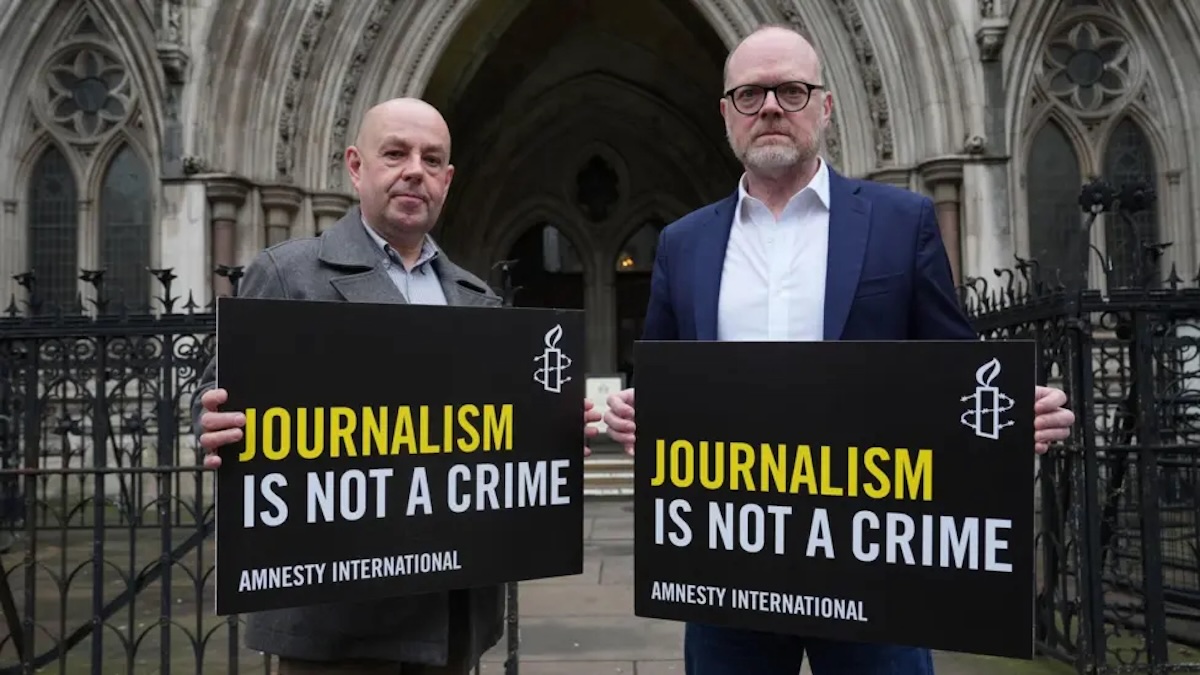
A British tribunal’s ruling that police forces illegally spied on Irish journalists and lawyers could have serious repercussions for the PSNI and the police chief who ordered the surveillance operations.
Trevor Birney and Barry McCaffrey, both of the Detail website, made legal history when the Investigatory Powers Tribunal (IPT), found both the PSNI and the London Met police subjected the pair to unlawful spying in an attempt to uncover their sources.
The tribunal found that three surveillance operations, spread over six years, were unlawful; found that other media were also spied upon, including the BBC; and ordered the PSNI to pay damages.
The ruling came after a six-year fight by the journalists to uncover the extent of the surveillance and deliberate harassment against them.
The two journalists were wrongly arrested in early morning raids in August 2018, months after releasing their documentary, No Stone Unturned, on Crown Force collusion in the loyalist paramilitary massacre of six innocent Catholic civilians in a pub in Loughinisland, County Down in 1994.
The PSNI were later forced to apologise for the arrests and paid substantial damages.
In a written judgment the tribunal ruled that former PSNI Chief George Hamilton illegally ordered the undercover surveillance operation in 2018.
The tribunal rejected PSNI claims that the operation was only designed to target a Police Ombudsman official and not the journalists.
The tribunal also found Hamilton’s decision to authorise the operation violated the European Convention on Human Rights (ECHR) and the Human Rights Act 1998, and quashed the spying order.
The tribunal revealed how, beginning in 2012, police in London, acting on behalf of the PSNI, obtained telephone data belonging to Mr McCaffrey and the then BBC journalist Vincent Kearney.
This data was shared with the PSNI and Durham police. Disclosures given to the tribunal revealed that more than 4,000 text messages and phone communications belonging to Mr Birney, Mr McCaffrey and more than a dozen journalists working for the BBC’s Spotlight programme, were illegally accessed.
In September 2013, the PSNI went through Mr McCaffrey’s mobile phone records for three weeks after he made a phone call to the PSNI press office while he was investigating separate allegations of police corruption.
This operation against Mr McCaffrey was also unlawful, the tribunal ruled. It found police breached Mr McCaffrey’s Article 8 and Article 10 rights under the European Convention (ECHR).
It ordered the PSNI to pay £4,000 each in damages to Mr Birney and Mr McCaffrey.
In the course of the inquiry, the PSNI was forced to admitted that they spied on no less that 300 journalists and 500 lawyers in the north of Ireland alone.
Responding to the findings, Mr Birney said that only a public inquiry would uncover the full extent of police surveillance operations.
“I hope that our judgment today will help to protect and embolden other journalists pursuing stories that are in the public interest,” he said.
“The judgment serves as a warning that unlawful state surveillance targeting the media cannot and should not be justified by broad and vague police claims. The judgment raises serious concerns about police abuse of power and the law. Our case has exposed the lack of effective legal safeguards governing secret police operations.”
Mr McCaffrey said better legal safeguards were needed to protect journalists and their sources.
“This ruling marks a significant victory for press freedom, and it has exposed critical failures in both the monitoring and oversight of surveillance operations carried out against journalists and their sources,” he said.
The ruling had reinforced the urgent need for increased legal safeguards to protect journalists and their sources.
“Despite all of their efforts, the police were still unable to identify our sources for the film,” he said. “They wasted police time and resources going after us instead of the Loughinisland killers.”
He added: “The judgment, particularly its condemnation of Sir George Hamilton’s leadership, highlights the urgent need for reform.
“The police need to change, they should respect press freedom, they must abide by the rule of law and uphold the democratic principles of transparency and accountability.”
He added: “For this court to have found that a Chief Constable has acted unlawfully, we think is a major embarrassment, and it’s something that needs there to be a public inquiry. No other alternative - we need a public inquiry.”
There could be further repercussions for the PSNI and Hamilton, according to former Police Ombudsman Baroness Nuala O’Loan, who is a member of an official review group looking into the scandal. She said it was “of great significance” and “of grave concern” that the PSNI continued to break the law until at least 2018, but declined to comment further.
Daniel Holder, director of the Committee on the Administration of Justice said it was “particularly concerning” that the PSNI’s illegal actions were “grounded in a desire to shield state agents who are suspects in legacy killings from accountability”.
“Nobody is above the law and going after journalists who expose state involvement in some of the worst atrocities of the conflict its not what should be expected in a democratic society.”
SDLP leader and south Belfast MP Claire Hanna said the two journalists and their legal teams has “exposed a culture within the PSNI that demonstrated a lack of respect for the freedom and protection of journalism - a hallmark of any democracy”.
Sinn Féin South Down MP Chris Hazzard said it was “not lost” on the people of South Down that the “time, effort and resources deployed by the British state to suppress journalists stands in stark contrast to the abysmal failure to investigate the murder of six men watching a football match in Loughinisland in 1994.”
![[Irish Republican News]](https://republican-news.org/graphics/title_gifs/rn.gif)
![[Irish Republican News]](https://republican-news.org/graphics/title_gifs/harp.gif)

